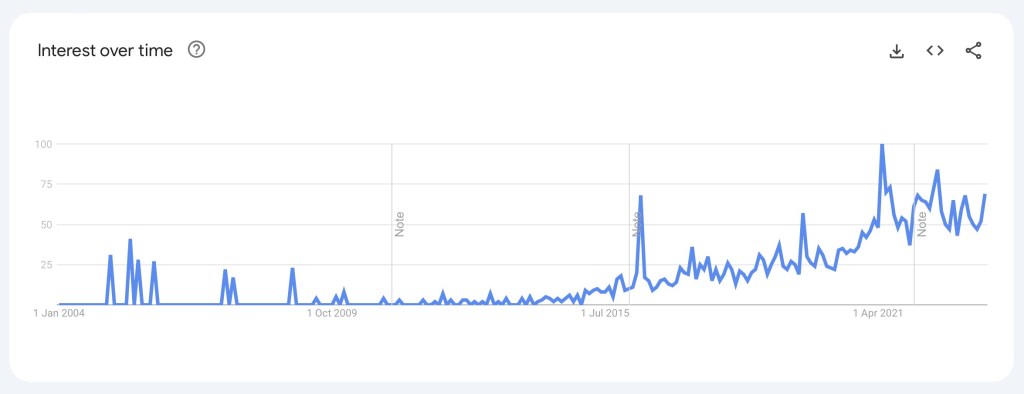The internet’s obsession with non-binary people: Data shows explosion of good and bad content

There has been an explosion of interest in non-binary identities in recent years. (Getty/PinkNews)
Non-binary people are talked about constantly online, generally by people who aren’t themselves non-binary.
Chatter about us has exploded during recent years, highlighting the public’s expanding awareness of the existence of non-binary gender identities. That awareness has not come from formal education, rather from trailblazing non-binary individuals publicly sharing their stories about how they started to live more authentically, such as Demi Lovato and Mae Martin, who came out in 2021, and Janelle Monae, who did so in 2022.
It’s not just online – debates are conducted in print newspapers, in parliament, in workplaces, between friends and family, and in public gatherings. But it is in online spaces where anonymous social media accounts can issue dozens of posts every hour, and where mainstream media organisations have published tens of thousands of pages of content which mention non-binary people.
You would be correct to assume that many of these play into the culture war and moral panic about trans and non-binary people. The subjects of discussion beyond non-binary people as a category of person range from celebrity stories such as Sam Smith’s existence, to nakedly transphobic angles such as dog whistle criticism of institutions for allowing staff to display pronouns on their badges.
While search engines are not perfect, according to Google, MailOnline has, to date, published around 65,000 pages that mention “non-binary”. The BBC has published 3,600, The Sun around 900, The Times – the UK’s newspaper of record – 776, The Guardian – which is the target of a boycott by trans and non-binary writers – 357, and Sky News 210.
Many of these articles purport to be neutral or positive, but a significant proportion are written in a way which stigmatise or ridicule non-binary people. Perhaps this is because so few employ non-binary writers.
The volume of discussion is also entirely disproportionate – according to the most recent census data, there were 30,000 non-binary people in England and Wales in 2021. Yet, in 2021 alone, over 20,000 articles posted from the UK mentioned non-binary people.
Social media and Mumsnet
Away from news outlets, there are many forums where trans and non-binary people are discussed at length. Comments sections under articles which mention gender or non-binary celebrities, or other topics related to non-binary people, quickly fill up with people discussing our lives.
Twitter has been a seriously toxic environment for trans and non-binary people for years, long before Elon Musk came along and tried to redefine cis, as in cisgender, as a slur.
The platform has such a vast array of problems relating to its treatment of trans and non-binary people, such as ruling that transphobic Tweets do not breach its community guidelines, that it is not possible to cover with the attention its transphobia deserves in this single article.
Other platforms are hotbeds of discussion. Reddit – the so-called front page of the internet – has over half a million pages which mention non-binary people. Reddit is a much more dynamic environment where people from a wider variety of political and social backgrounds are able to ask for advice and start debates.
More concerning is the forum Mumsnet. According to Google, there are nearly 4,000 posts on the site which mention non-binary people. Mumsnet has gained notoriety in the trans and non-binary community for providing a safe haven for “gender-critical” voices.
Online discussion of non-binary people is a mixed bag – but there’s more positive than negative
A basic search for “non-binary” on Google returns nearly 60 million pages, and Google’s own trends data shows a clear upward trend in search for the term in the UK since 2015, with a significant acceleration from early 2021.

Data provided by media monitoring firm Cision shows that the sentiment of this content is mixed – but, perhaps surprisingly, is weighted towards the positive.
Cision looked at online content published in the UK from 2017 to the end of 2022, totalling over 87,000 rateable posts. Across that period, of the content which was rated as positive or negative, positive articles (nearly 22,000) outnumbered negatives ones (just over 9,000) by more than two to one.

However, most of the content was assessed to be neutral (over 55,000). This may be explained by increasing volumes of factual content which mentions non-binary people, such as equality and diversity training materials.
There was an increase in content being published between 2021 and 2022, of which an even higher proportion as positive. This may be because expanding formal, informal and workplace education about non-binary people has been taking place.
Our existence as non-binary people does often lead others to reflect on their own gender identities and that can be an uncomfortable experience, especially given the tight constraints that the patriarchy places on people’s ideas of what gender is.
It may be that the outsized volume of chatter can be attributed to media organisations and tech giants cynically taking advantage of that discomfort and directing unwarranted attention to non-binary people.
This means it’s more critical than ever that people are able to engage in formal education about gender and gender diverse identities in schools.
How did this story make you feel?

